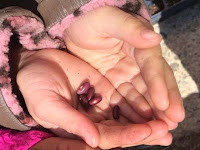Tribes of the Hudson Valley, Part 4: Teachers
 |
| Jim Fossett |
Grab a copy of the newspaper each month in Ulster & Dutchess, or subscribe for home delivery.

Let Freedom Ring. There will be a patriotic ceremony with dramatic readings and stirring songs. The Third Ulster Militia will be encampe...
01 Jul 2016 | 0 comments | Read more
Bard Summerscape Dance: “Fantasque.” Magical new family-friendly dance event created by brilliant contemporary artists John Heginbotham an...
01 Jul 2016 | 0 comments | Read more
By Anne Pyburn Craig “My grandfather was a beekeeper,” says Keith Duarte, owner of Damn Good Honey Farm in Kerhonkson w...
28 Jul 2016 | 0 comments| Read more
By Maria Reidelbach Thin-skinned, glowing, red strawberries, freckled with a multitude of seeds; deep indigo blueber...
28 Jul 2016 | 0 comments| Read more
By Jodi La Marco Dance on Friday to the Hillbilly music I’m a likeable chap, the girls all say I’ll tumble your outhouse ov...
28 Jul 2016 | 0 comments| Read more
By David Dewitt Lately I’ve been performing again. Singing and acting. Something I used to do with more regula...
28 Jul 2016 | 1 comments| Read more
By Maria Reidelbach Thin-skinned, glowing, red strawberries, freckled with a multitude of seeds; deep indigo blueber...
28 Jul 2016 | 0 comments| Read more
Blood-veined sorrel by Maria Reidelbach Okay, be honest: does locally grown food sometimes weird you out? Of course, these d...
01 Jul 2016 | 0 comments| Read more
by Maria Reidelbach The mere existence of an herb like lovage gives me great hope and joy. Lovage is incredibly delicious, extreme...
01 Jun 2016 | 1 comments| Read more
by Maria Reidelbach Forsythia wall. A jarring experience that I’m sure many of my Hudson Valley neighbors share is roaming our t...
03 May 2016 | 0 comments| Read moreby Polly Howells Eco-philosopher Joanna Macy, in her seminal work Coming Back to Life, outlines the inner work that each of us must do...
06 Aug 2015 | 1 comments| Read more
On June 5 the Stick to Local Farms project will debut the third annual map of Rondout Valley farms that offer a free art sticker to each ...
01 Jun 2016 | Read more
by Eric Francis Aries (March 20-April 19) Focus on your family and home and everything else will fall into place. If you build your...
02 Jun 2015 | Read more
by Terence P Ward If you're itching to tie one on — a lure, that is — and you're casting about for some healthy trout, D...
01 Jun 2016 | Read more
by Marie Doyon In the last century alone, the dizzying evolution of technology has profoundly impacted agriculture a...
02 Jun 2015 | Read more
by David McCarthy The work of shifting our global economy toward one that honors both people and planet is immensely compl...
02 Nov 2015 | Read more
by Ajax Greene It was a tough year for me, 2014—about the worst ever financially, tough emotionally and physically. Normal...
03 Dec 2014 | Read more
by Lee Reich For no apparent reason, seedlings sometimes seem to take longer than usual to poke their first green shoots up throu...
01 Jun 2016 | Read more Smart Beer: Local Company Serves Up New York's First Organic Beer
Smart Beer: Local Company Serves Up New York's First Organic Beer  Kingston YMCA Farm project
Kingston YMCA Farm project  Beahive Hudson Valley
Beahive Hudson Valley  Rondout Valley OrganicsMember Goods
Rondout Valley OrganicsMember Goods  Business Profile: Poughkeepsie Farm Project
Business Profile: Poughkeepsie Farm Project  The Cary Institute
The Cary Institute  Westwind Orchard
Westwind Orchard  Robert George Design Group
Robert George Design Group  The Village TeaRoom
The Village TeaRoom